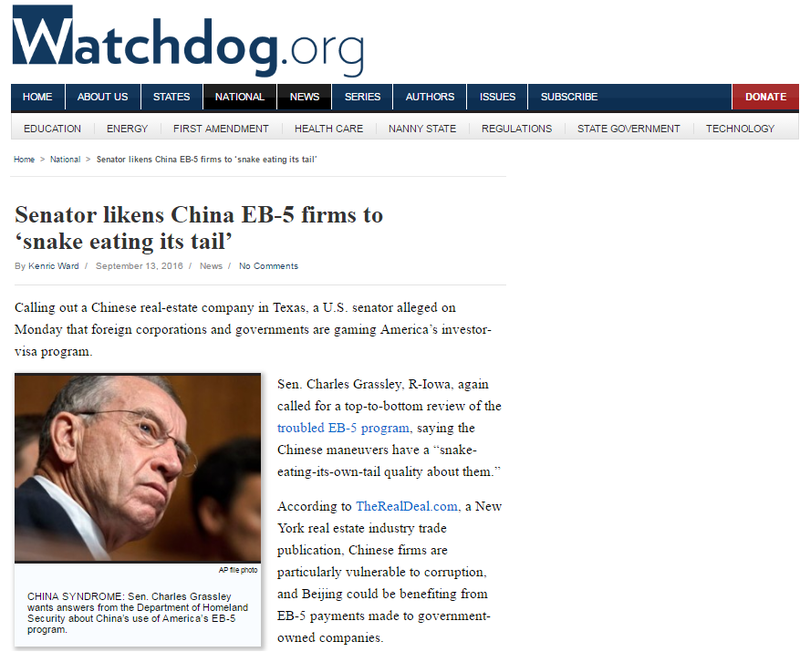Senator likens China EB-5 firms to ‘snake eating its tail’
Calling out a Chinese real-estate company in Texas, a U.S. senator alleged on Monday that foreign corporations and governments are gaming America’s investor-visa program.
Sen. Charles Grassley, R-Iowa, again called for a top-to-bottom review of the troubled EB-5 program, saying the Chinese maneuvers have a “snake-eating-its-own-tail quality about them.”
According to TheRealDeal.com, a New York real estate industry trade publication, Chinese firms are particularly vulnerable to corruption, and Beijing could be benefiting from EB-5 payments made to government-owned companies.
In the Texas case cited by Grassley, Chinese real estate developer Modern Land manages the Crown Point EB-5 Regional Center in Houston to build houses for Chinese nationals who purchase investor-visas to enter the U.S.
“After investors obtain green cards, for $500,000 apiece, Modern Land plans to offer them the option to apply that money toward the purchase a home,” Grassley related in a letter to Homeland Security Secretary Jeh Johnson.
“Permitting foreign ownership of a [EB-5] regional center improperly allows foreign corporations to acquire interests in U.S. real estate projects, market U.S. green cards to foreign investors, and in some cases gain significant profits from selling EB-5 developed products, i.e., new homes, to foreign investors,” wrote Grassley, the Senate Judiciary Committee chairman who has pushed repeatedly to overhaul the investor-visa system.
“EB-5 investment projects that create a tangible output, such as a real estate development, that is principally, if not exclusively, available for the enjoyment only of the foreign investors themselves, have a snake-eating-its-own-tail quality about them that Congress absolutely did not intend,” the senator said.
“They subordinate any benefit to the American people … to the benefit of wealthy foreign investors,” he charged.
Citing other Chinese EB-5 centers in New York and Illinois, Grassley noted that the foreign firms are not subject to U.S. securities regulations.
Crown Point did not answer Watchdog.org’s request for comment. Johnson’s office, whose department oversees the U.S. Citizenship and Immigration Services, had not responded to Grassley’s letter by publication.
With the EB-5 program scheduled to expire Sept. 30, Grassley and Sen. Patrick Leahy, D-Vermont, have introduced legislation to overhaul the system. A similar House measure was filed Friday by Reps. Bob Goodlatte, R-Virginia, and John Conyers, D-Michigan.
Both bills seek to curb EB-5 fraud and abuse and return the program to its original intent of assisting rural and economically depressed parts of the country.
“We need strong measures to curb fraud, increase transparency and make sure U.S. regulators and foreign investors know where every dollar is coming from and going. Without reforms to protect U.S. interests, national security and areas that need investments most, the program should expire,” Grassley said.
Shae Armstrong, a Dallas-based attorney familiar with EB-5 issues, applauded the reform efforts, saying the bills “would purify the EB-5 industry.”
http://watchdog.org/275625/china-eb5-immigration/
Mentions
- Crown Point Regional Center
- The Real Deal
- U.S. Citizenship and Immigration Services
- Chuck Grassley
- Patrick Leahy
- Shae Armstrong
States
- Texas
Securities Disclaimer
This website is for informational purposes only and does not constitute an offer or solicitation to sell shares or securities. Any such offer or solicitation will be made only by means of an investment's confidential Offering Memorandum and in accordance with the terms of all applicable securities and other laws. This website does not constitute or form part of, and should not be construed as, any offer for sale or subscription of, or any invitation to offer to buy or subscribe for, any securities, nor should it or any part of it form the basis of, or be relied on in any connection with, any contract or commitment whatsoever. EB5Projects.com LLC and its affiliates expressly disclaim any and all responsibility for any direct or consequential loss or damage of any kind whatsoever arising directly or indirectly from: (i) reliance on any information contained in the website, (ii) any error, omission or inaccuracy in any such information or (iii) any action resulting therefrom.




